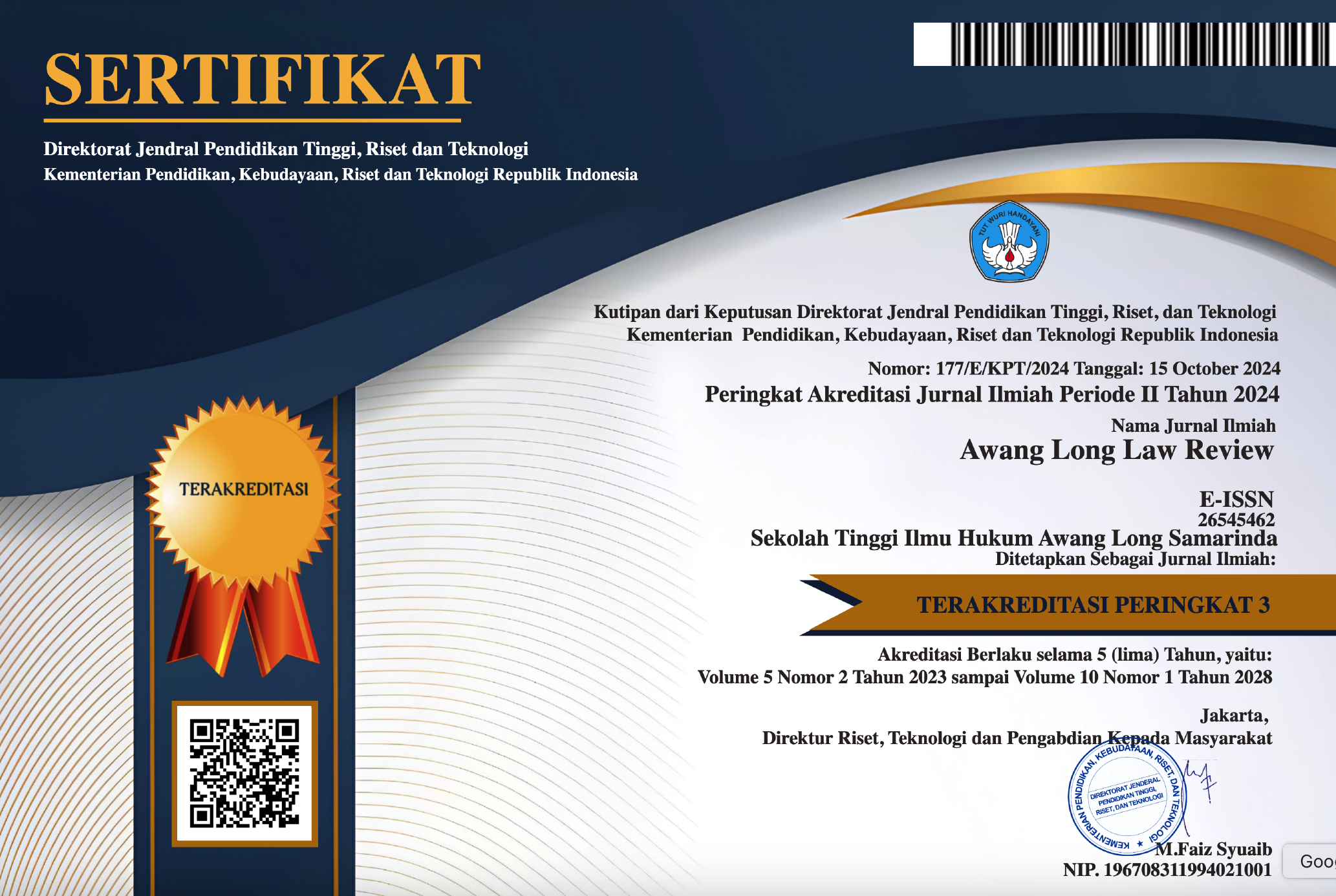FREE HEALTH GUARANTEE FOR THE POOR PEOPLE POST HEALTH LAW OMNIBUS LAW
Abstract
The establishment of the National Social Security System is realized through Law Number 40 of 2004 concerning the National Social Security System (UU SJSN) which has a health insurance program, work accident insurance, old age insurance, pension insurance and death insurance. Health insurance as part of the social security system in Indonesia is indeed a form of social assistance program for health services for the poor and disadvantaged. This program is organized nationally to guarantee cross-subsidies in order to create comprehensive health services for the poor. The purpose of this study is to examine free health insurance for the poor after the health omnibus law related to the regulation that the central and regional governments are required to provide financial protection to the poor and disadvantaged through the health insurance program, so that they can access health services without cost barriers. The research method used is normative juridical. free health insurance for the poor after the health omnibus law in the future (establishing rights) is by creating a single institutional model in the form of an institution mandated by all people. This is important, because in this way the collection of funds will be realized quickly. A single institution in the sense of the organizer of the National Social Security System as a container or umbrella that covers program organizers, so that program implementation can be carried out by several program organizers, especially free health insurance for the poor. The single institution in question is led by a Director, under the National Social Security Council (DJSN), who is directly responsible to the President. The future model is the Free Health Insurance Agency for the Poor.
Downloads
References
Aditya, Z. F., & Fuadi, A. B. (2021). Konseptualisasi Omnibus Law Dalam Pemindahan Ibukota Negara. Jurnal Ilmiah Kebijakan Hukum, 15(1).
Anggraeni, R., & Rachman, C. I. L. (2020). Omnibus Law in Indonesia: Is That the Right Strategy? Atlantis Press, 140(Icleh), 180–182. https://doi.org/10.2991/aebmr.k.200513.038
Bagiastra, I. N. (2023). Gagasan omnibus law kesehatan sebagai kebijakan hukum nasional dalam upaya meningkatkan derajat kesehatan masyarakat di Indonesia. Jurnal Penelitian Hukum De Jure, 22(4), 33–46. http://dx.doi.org/10.30641/dejure.2023.V23.033-046
Cottin, R. (2018). Free health care for the poor: a good way to achieve universal health coverage? Evidence from Morocco. Working Papers, 33. https://ideas.repec.org/p/dia/wpaper/dt201816.html
Fajar, M., & Achmad, Y. (2015). Dualisme Penelitian Hukum Normatif dan Empiris. Pustaka Pelajar.
Fasyehhudin, M. (2023). Protection and Certainty of Social Welfare Law in the Concept of a Welfare State: Perspective of State Administrative Law. Ournal Pena Justisia:Media Komunikasi Dan Kajian Hukum, 22(1).
Fitryantica, A. (2019). Harmonisasi Peraturan Perundang-Undangan Indonesia melalui Konsep Omnibus Law. Gema Keadilan, 6(3). https://doi.org/https://doi.org/10.14710/gk.2019.6751
Hadiyono, V. (2020). Indonesia Dalam Menjawab Konsep Negara Welfare State dan Tatangannya. Jurnal Hukum, Politik Dan Kekuasaan, 1(1), 23. https://doi.org/ 10.24167/jhpk.v1i1.2672
Malusha, J. M. (2022). The Experiences on Attempts and Challenges of Providing Free or Affordable Universal Health Care in Developing Countries: Review of Kenyan Situation. European Journal of Development Studies, 2(5), 32–37. https://doi.org/10.24018/ejdevelop.2022.2.5.174
Nachrawi, G. (2024). Holdingisasi BUMN Suatu Keniscayaan untuk Kesejahteraan Rakyat.CV Cendikia Press.
Nainggolan, V., & Herning Sitabuana, T. (2022). Jaminan Kesehatan Bagi Rakyat Indonesia Menurut Hukum Kesehatan. SIBATIK JOURNAL: Jurnal Ilmiah Bidang Sosial, Ekonomi, Budaya, Teknologi, Dan Pendidikan, 1(6), 907–916. https://doi.org/10.54443/sibatik.v1i6.109
O’Donnell, O. (2024). Health and health system effects on poverty: A narrative review of global evidence. Health Policy, 142(November 2023), 105018. https://doi.org/10.1016/j.healthpol.2024.105018
Pamungkas, T. J., & Hariri, A. (2022). Tanggung Jawab Negara dalam Pemenuhan Jaminan Sosial Persepektif Welfare State. Media of Law and Sharia, 3(4), 270–283. https://doi.org/10.18196/mls.v3i4.15198
Prabowo, A. S., Triputra, A. N., & Junaidi, Y. (2020). Politik Hukum Omnibus Law di Indonesia. Pamator Journal, 13(1), 1–6. https://doi.org/10.21107/pamator.v13i1.6923
Saputri, N. S., & Murniati, S. (2022). Kajian Dampak Bantuan Iuran Program Jaminan
Kesehatan pada Masyarakat Miskin dan Tidak Mampu. Smeru, 1, 1–59. http://repository.unair.ac.id/id/eprint/17554
Sihombing, E. N., Yusrizal, M., & Syaputra, A. (2020). Implementasi Penggunaan Kecerdasan Buatan dalam Pembentukan Peraturan Daerah. Jurnal Ilmiah Kebijakan Hukum, 14(3). https://doi.org/10.30641/kebijakan.2020.V14.419-434
Sugiyono. (2020). Metode Penelitian Kuantitatif, Kualitatif dan R&D. Alfabeta.
Copyright (c) 2024 I Putu Harry Suandana Putra, Donimikus Rato, Bayu Dwi Anggoro

This work is licensed under a Creative Commons Attribution-ShareAlike 4.0 International License.







